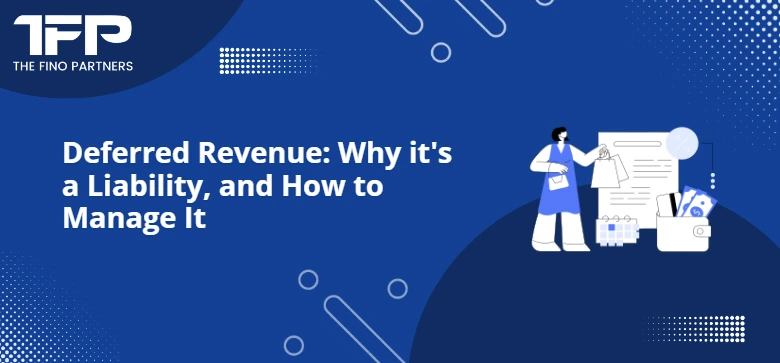Deferred revenue, also sometimes referred to as unearned revenue, ranks among the leading concepts for businesses, particularly for businesses that deliver services or products before achieving complete payment. Generally, deferred revenue is defined as income that is earned by a business for goods or services yet to be delivered. Since the obligation to service is on, it forms a liability on the balance sheet for the revenues that are generated through this deed. Management of deferred revenue is very important and in reality, forms part of the financial reporting. So let's dive in and understand why deferred revenue is, in fact, a liability. It also provides strategies for efficient Deferred Revenue Management by The Fino Partners.
Why is Deferred Revenue Considered Liability?
The nature of deferred revenue makes it a liability since it entails some form of obligation by the business to the customer. Even though the money has been received, as yet no corresponding product or service has been provided. Here's why it is classified in this manner:
- Obligation to Deliver Services: There exists an obligation up until the product or service is delivered on the part of the business to the customer.
- Unearned Revenue: It would be recognized only after the firm has provided the service or product.
- Risk of Possible Refund: In case the company does not deliver, it can face refunding the money.
How to Ensure Proper Management of Deferral Revenue
- Payment Records Reveal into accounts that there is proper record keeping for advance payments received in advance for services at a future date as deferred Revenue recognition shall be done by balancing the payment schedules once the service is delivered.
- Advanced Accounting Tools
- Monitor and Control Advanced Accounting Tools
- Software applications such as QuickBooks or Xero help the companies monitor and control the deferral revenue effectively.
- These products enable the companies to automatically monitor The Fino Partners' control over Deferred Revenue.
- Partner with Professional Accountants
- Partnering with the consulting company for the Small Business Expert Accounting Service ensures that revenue is recognized at the appropriate time.
- Accountants allow the maintenance of compliance with relevant U.S. GAAP that helps avoid any type of misreporting.
Management of Deferred Revenue
Having professionals manage your business's deferred revenue can lessen the financial management burden. Here's how The Fino Partners can help:
- Correct and timely recognition of revenues: With professional accountants, revenue is bound to be recognized correctly and on time.
- Compliance assurance: Ensure that the company will not be breaking any law and that there will be no financial mess.
- Efficient reporting: Provide timely and accurate financial statements based on the health of your company's financial condition.
Outsourced Accounting for Deferred Revenue
Although small to medium-sized businesses can benefit from the relief of overburdened work by sending these tasks elsewhere, there are a few reasons why:
- Cost-Cutting Initiatives: Indeed, the in-house employees one employs for specific work like managed services including deferred revenue management are expensive. Always overhead cost-cutting.
- Knowledge Expertise: Accounting firms have expertise in The Fino Partners Deferred Revenue Management. Hence, the execution would be perfect.
- Travel time is not used: Let your in-house team be free to handle the core competencies of the business. The expert management of funds does it all.
How Expert Accounting Services for Small Business Can Help
Small business firms rarely collect their revenues as most of them possess fewer resources or less expertise. Here's what Expert Accounting Services for Small Business does to help:
- Professional Support: Trained accountants who expertly understand the concept of deferred revenues will be at your disposal
- Tailored Solutions: Professional accounting services tailor your business needs
- Compliances: Updates with federal and state laws to eliminate fines and penalties.
Best Practices for Managing Deferred Revenue
To ensure that the financial reporting is done correctly, together with regulations, proper management of deferred revenue has to be performed. Here are the best practices that ought to be followed by each business:
1. Align Revenue Recognition with the Delivery of Services
Revenue recognition occurs only upon delivery of the service or product
2. Monitor your Balance Sheet Regularly for Deferred Revenue Accounts
Always check the balance sheet to ensure that no deferred revenue has been accounted for as earned revenue.
3. Get the Right Accounting Software
Use automated accounting tools that can accurately track Deferred Revenue Management by The Fino Partners
4. Train Your Team
Let your finance team understand the importance of deferred revenue and how to handle it properly.
Conclusion
Since it directly flows into the entity, it is termed as deferred revenue, that is, the positive inflow of cash though remains a liability until the services are delivered. This therefore calls for correction and proper management of deferred revenue so that your financial information may be accurate and not misleading regarding the soundness of your financials. Only through a meeting with accounting firms such as The Fino Partners can an organization make easier strides in making sure that accounts payable are made free of discrepancies in financial reporting.
Services by The Fino Partners include Deferred Revenue Management, account outsourcing, and expertise for small businesses that facilitate companies to grow more by letting professionals handle all that complexity in the world of finance. Do you need help in managing deferred revenue? Fino Partners offers cutting-edge Deferred Revenue Management, Outsourced Accounting for Deferred Revenue, and compliance services. Let the finance bookkeeping be taken care of so that you can focus on running the business.




























